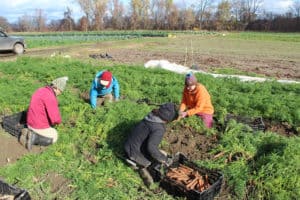Rutland’s VFFC received $37,348 to purchase a new cargo van fit with refrigeration
The Vermont Agency of Agriculture, Food, and Markets announced April 21 $300,000 in sub-awards to five regional nonprofit food hubs as part of a Northern Border Regional Commission (NBRC) award.
This investment will support Vermont food hubs with critical infrastructure needs, allowing them to support more farm and food businesses, expand their workforce, and advance ongoing efforts to access larger markets. These awards recognize the need for more local food collection and distribution experienced by Vermont food hub organizations and the supply chain disruption impacts of the Covid-19 pandemic.

A total of $300,000 in grant funding has been announced to help grow infrastructure critical to help grow local food access.
A food hub is a business that offers local supply chain support to collect, distribute, and market local food products from various farms and producers. They may sell local produce, meat, dairy, value-added products, or baked goods to wholesale, retail, or institutional markets, and ensure the buyer knows where each product came from through source-identification. Many of Vermont’s food hubs also provide farm-to-school program support, consumer education, transparent pricing and high-quality customer support.
Vermont Farmers’ Food Center (VFFC) in Rutland received $37,348 to purchase a new cargo van fitted with refrigeration to transport regional products to its aggregation space. This will allow the food center to strengthen its supply chain logistics role along the Route 7 corridor, allowing for regional haulers’ increased access to Rutland County food products.
Other awards include:
- Food Connects in Brattleboro will use $95,764 to help build out their cold, frozen, and dry storage capacity in its new aggregation space. This will expand its capacity to serve markets in Boston, New York City, and Washington, DC, in collaboration with Vermont Way Foods.
- Center for an Agricultural Economy in Hardwick will use $71,823 to support the outfit of its 3,000 square foot space at the Yellow Barn project, doubling its local product storage capacity. This will support expanded frozen inventory for its Just Cut program, serving institutional markets, and better position Farm Connex to distribute to Boston, New York City, and other regional markets in partnership with Vermont Way Foods.
- ACORN in Middlebury will use $60,618 to build a centralized aggregation and distribution space for rural farms/producers to store their products. This will allow for larger distribution networks and retail locations to have more streamlined access to Addison County products year-round.
- Intervale Center in Burlington will use $34,447 to purchase, outfit, and install a walk-in deep freezer that will double frozen storage capacity at the Intervale Food Hub. This will help maintain year-round availability of highly desired frozen products and allow the center to pilot an expansion of direct-to-consumer shipping of local product to statewide and regional markets.
A priority focus of this NBRC award is to expand Vermont producers’ access to out-of-state metropolitan markets and support opportunities for farm and food producers of many sizes to access new markets in cities like Albany, Boston, and New York City.
Food hubs play a critical role in supporting farm and food businesses of all sizes, offering an ability to aggregate, store, distribute, and market products from all over the state, maintaining source identification, transparency in pricing structures, and values-led relationships with producers. While many businesses rely on robust markets outside of Vermont to sustain or grow their enterprise, distribution bottlenecks make this difficult.
The Vermont Agriculture and Food System Plan notes that a “lack of in-state warehousing and cross-docking makes distribution throughout the state less efficient” and that “delivery to metropolitan areas is logistically challenging,” even though these larger cities offer significant market opportunity.
NBRC funding aligns with the Vermont Agriculture and Food System plan’s priority strategy No. 7, which calls for “significant investment in storage, processing, and distribution infrastructure to…expand regional market access for businesses and increase the resilience of local supply chains.” This funding will not only support each individual entity, but allow for increased collaboration, shared infrastructure, and greater efficiency between food hubs in different parts of the state to reach beyond Vermont’s borders.
For more information visit nbrc.gov.




